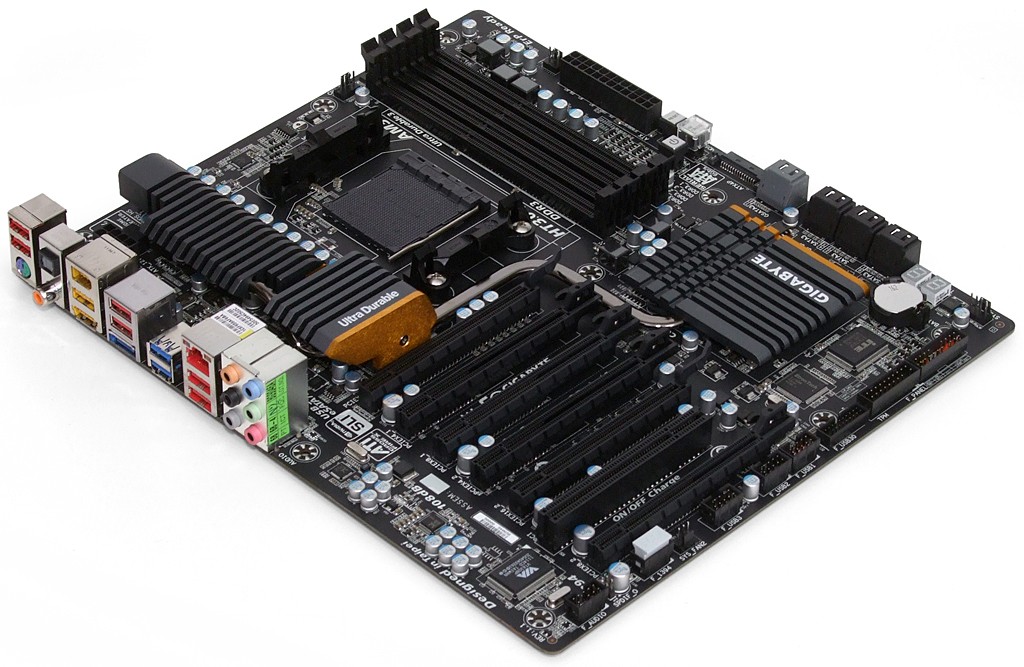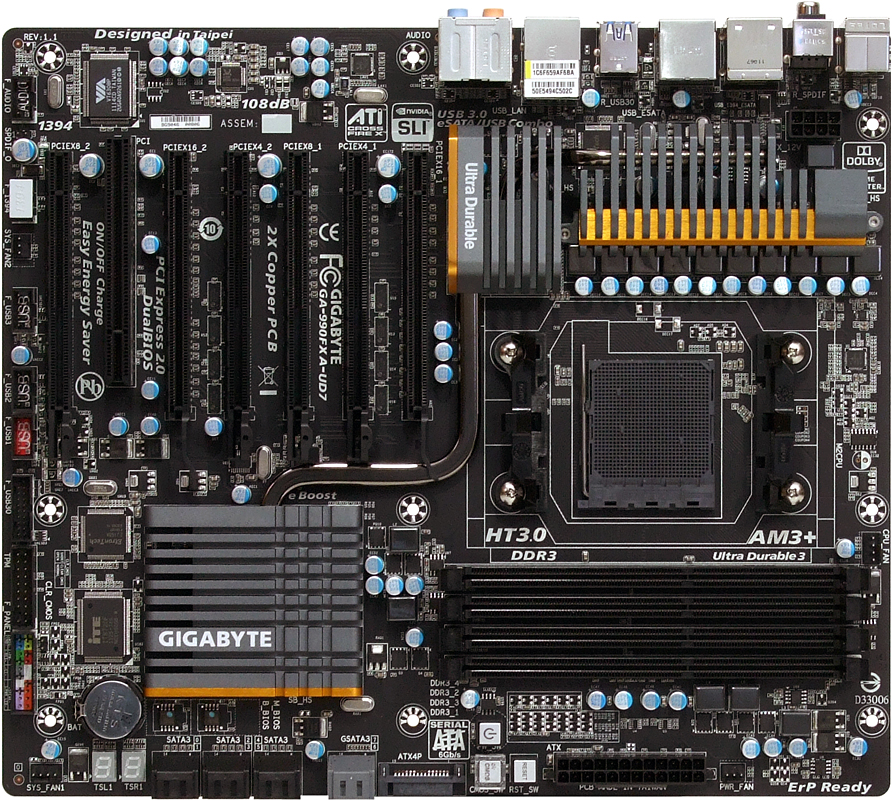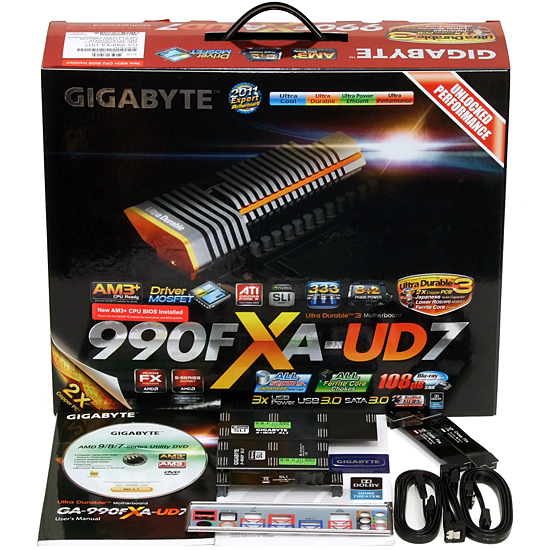Five $160 To $240 990FX-Based Socket AM3+ Motherboards
Forty-two PCIe lanes give the 990FX a clear connectivity lead over competing Intel chipsets. We compare five class-leading products using AMD's FX-8150 to see which offers the best combination of performance, overclocking, integrated features, and value.
Gigabyte GA-990FXA-UD7
Gigabyte targets the gaming community by offering the only true four-way SLI-compatible slot configuration in today’s round-up. Getting back to the AMD theme, that could also make the 990FX-UD7 ideal for four-way CrossFireX.
Anyone who would rather have a ton of monitors attached to their PC will note that the 990FXA-UD7 supports up to six single-slot PCIe graphics cards, though lane limitations force the second and fourth x16 slots down to four-lane transfers. The first and third graphics slots switch from x16/x0 to x8/x8 when a card is installed into the third slot, as do the fifth and seventh slots.
This would be almost perfect had Gigabyte put a forward-facing USB 3.0 header where its “ATX4P” connector resides. Instead, the USB 3.0 header is found along the bottom edge, faces outward, and cannot be utilized when a graphics card is installed in the bottom slot. Gigabyte tells us that this was necessary to accommodate the motherboard's layout, and mentioned making a more conscious effort to relocate that header in the future.
Unlike Asus' and ASRock's models, the 990FXA-UD7 is the only board with a graphics slot located so close to its memory slots that users might actually want single-sided DIMM latches. Also unlike Asus and ASRock, Gigabyte doesn’t have them. Fortunately, we were able to install and remove memory with a card in the top slot, but we're also craftier than many system builders.
Bench testers will love that the 990FXA-UD7 includes a lighted CLR_CMOS button right next to its power and reset buttons, but they’ll probably have more love for the fact that it employs a clear snap-on cover to prevent accidental invocation.
Filling the 990FXA-UD7 with graphics cards would prevent builders from adding any add-in storage controllers. So, Gigabyte integrates a couple of them on the board itself. A pair of Marvell 9172 SATA 6Gb/s controllers add two eSATA and two SATA ports to the six enabled by AMD’s SB950 southbridge.
The 990FXA-UD7 includes two-way, three-way, and four-way SLI bridges. Gigabyte even throws in a pair of CrossFire bridges, in spite of the fact that most AMD cards include them. Four SATA cables, on the other hand, appear merely adequate for a board that has eight ports, even after we consider that we’d probably use the third-party-controlled ports for front-panel eSATA.
Get Tom's Hardware's best news and in-depth reviews, straight to your inbox.
-
timbo1130 How is this relevant to enthusiast? Bulldozer is out classed by Sandy Bridge I don't care if there are a few less sata ports. If you need to upgrade your better off going with Sandy bridge and z68 or p67 or wait for SB-E and X79.Reply -
julianbautista87 thanks for this article. I was waiting for it since some guy said that the 8150 was performing badly because of the mainboard used, but now I see that that was not correct.Reply -
_Pez_ Yeah If were to buy this boards would be with a Phenom real 6 core CPU 1100T :D that is the smartest choice. I think.Reply -
frostweaver I would wait till next year to decide. I still feel that windows 7 aint optimized for BD.Reply -
Tijok First off, thanks for the great article, good to see Tom's is keeping up the top notch quality!Reply
Secondly, I would really like to see a piece on extreme CFX/SLI configurations on rigs like this. It seems an article with reliable information on this would be beneficial to gaming enthusiasts, IT professionals, and HPC builders alike!
Hope to see an article along these lines soon! -
palladin9479 I bought the Sabertooth during the summer and I can attest to how amazing that board is. It's really nice, lots of features and high quality. I'm running a Phenom II X4 970BE @ 4.3Ghz on water right now. Absolutely wonderful system.Reply -
ta152h What a bunch of pretzel logic we have in this article.ReplyOf course, a fan of Intel's work could argue against the need for 42 lanes of second-gen PCIe when the 36 native to X58 Express support multi-card graphics configurations just as capably. But such a comparison really isn't necessary. After all, we've known for almost a year that Intel’s lower-cost Sandy Bridge-based part outperform the pricey six-core Gulftown-based processors in many desktop benchmarks, including pretty much every gaming scenario we throw at the two platforms.
So, x58 is irrelevant, because SB beats it. Except AMD's offering is somehow relevant even though both x58 and SB beat it. What?????
If you ignore x58 because SB offers better performance, you ignore anything AMD has because a SB setup offers better performance. If you want 36 or less lanes, x58 still offers better processors than you can hope to get from AMD. Bizarre logic.
Not that AMD is irrelevant, just the logic is badly flawed.



